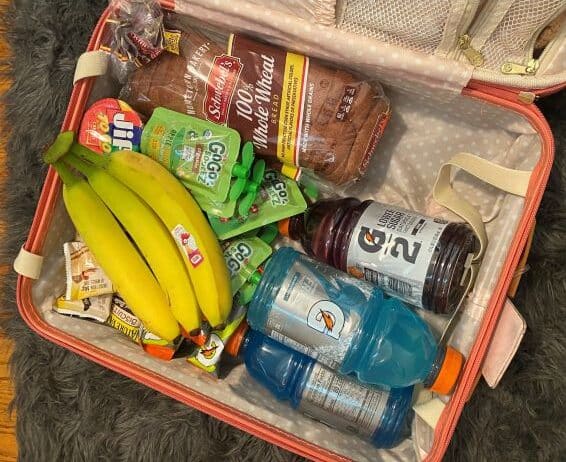There are so many things that go into a successful marathon. A runner needs to hit their training right, have proper rest and recovery, complete strength training, and of course you need to have appropriate nutrition.
Everything that goes into a marathon takes time and practice to get right. Before race day you make sure you get the miles in you need, follow your training plan, take care of yourself by making sure you get enough sleep and foam roll, and so much more.
Although all of those things are very important to have a successful 26.2, it is also critical to get your nutrition right. Fueling for a marathon is unlike anything you have ever done before (unless you have run a marathon of course). It takes time to learn what will work for you.
This article will go over marathon fueling tips and strategies for before and during your race.
Ready to learn more? Let’s dive in!
What to eat throughout marathon training
You spend months training for a marathon, weeks upon weeks for a race that will only take a couple of hours to complete. Making sure you get your nutrition right during training is arguably more important than getting it right on race day.
Runners are likely to feel extra hungry during marathon training, which makes total sense. You are spending many hours outside running, expending so much energy. You need to replenish this energy in the form of delicious food!
Try to eat a balanced diet full of carbohydrates, protein, and fats. Eat at least 3 meals a day with added snacks as needed. Listen to your body, if you feel hungry, you more than likely need to eat. Carry snacks with you if you leave the house for extended periods of time. Finally, follow a real food first mentality, try to get all of your nutrients from foods before supplements. If you do end up taking a supplement, make sure it is safe and necessary.
Practice marathon fueling during long runs
It is imperative to practice your marathon fueling strategy. You do not want to get to race day without a plan, and knowing what foods work for you. Trust me I’ve been there (thankfully only for a half marathon, not a full).
Sometimes your practice fueling runs may end up not so great, but that’s okay because at least you did not make that mistake during the actual race. The first thing you want to practice is what you eat the night before the long run.
The night before your long run
The night before your long run you should try to eat something similar to what you would eat on race day. Typically simple carbohydrates, such as pasta, potatoes, or rice with some lean protein such as chicken or fish. One of my favorite go-to meal is risotto with veggies and chicken.
Make sure to load up on fuel the night before your long run, especially if you are running first thing in the morning. Also, do not forget about hydration. Drink lots of water and electrolyte drinks the day before.
Right before your long run
Make sure you eat something before your long run. Fasted running is not the way to go for most runners. Find out what time your marathon is going to be, typically they are in the morning, and practice by doing your long runs around that time.
Prior to your long run, eat a breakfast of carbohydrates and some protein. Some examples of pre run foods include:
- Oatmeal with berries
- Toast with peanut butter and yogurt
- Bagel with cream cheese and banana
- Toast with jelly and scrambled eggs
- Yogurt with granola and your favorite fruit
- Banana muffin with applesauce
All of these pre run foods should be eaten with a glass of water or sports drink
During your long run
If you are running for over 75-90 minutes you should fuel during the run. Runners should be taking in upwards of 30g of carbohydrates every 30-45 minutes, or 60-90g per hour. It may be difficult at first to get in that much fuel, which is why it is important to start during training and slowly work your way up.
Some examples of fueling include energy gels, whole foods such as fruit, pretzels, fig bars, or sports drinks. Personally, my favorite mixture includes gels and applesauce pouches. Although, I have also tried other things such as frozen blueberries and Swedish fish with no adverse effects.
Some runners cannot stomach food during a run, which is where liquid forms of carbohydrates come into play. There are plenty of items available on the market that can be used for marathon training. Just remember, you will need to carry this with you during the race. Or, you could find out what sports drink option they are providing at aid stations during the race, trial that product to see if it works, determine how often the stations are, and figure out if that could be an option.
After every run make sure you have a post-run meal, and take note of how you feel. If there is something that you tried that did not work, you will know.
Fueling for the days leading up to the marathon
So your fueling plan for the race is down pat, and you are ready to crush your nutrition. Now the question is what do you eat in the days leading up to the marathon?
You are tapering your mileage, but your nutrition should stay about the same. Try to increase your carbohydrate intake throughout the week of the marathon, but don’t do anything too crazy. The main importance at this point of training is resting and staying hydrated.
Make sure you get enough sleep throughout this whole week to allow your body to rest. This will also help if you have trouble sleeping the night before the marathon as I often do. You can “bank” the sleep from previously in the week, so if you do not sleep well the night before it is not as big of a deal.
If you have to travel for your marathon, be sure to bring foods that you are used to eating. The last marathon I ran was the Chicago marathon, and below is a picture of my suitcase for this trip. We were in Chicago 2 days before the race, and I wanted to make sure I had everything I needed as we did not have a rental car.

Make sure you have packed the fuel you will take in during the race. I used gels for this race which are not shown in this picture, because I brought them in my carry-on just in case the suitcase got lost. (I also had my shoes and race day clothes in my carry-on, you can never be too careful).
The last few days leading up to the race you should focus on intake of easy to digest carbohydrates and hydration. I like to eat peanut butter and jelly sandwiches with purple gatorade.
Research the restaurants around you if you are racing out of town, and make a reservation in advance. This way you aren’t scrambling around trying to find somewhere to eat. Typically, I’ll eat at Italian restaurants to get some pasta for carb loading. Try to eat something similar if not the same as what you practiced the night before a long run.
Race day
You made it! All the hard work is done, and now you get to show what you have worked towards these last few months. I try to stay away from clichés, but one I very much agree with is “nothing new on race day”, particularly regarding nutrition.
Eat your breakfast that you have practiced throughout your training cycle. Drink your sports drink that you enjoy. Pack your fuel that you are going to eat during the run. Be sure to have a way to carry your fuel during the race (pockets are clutch here!).
Now it’s time to get out there and run your race! Don’t be tempted to try the fueling on the course, unless you have practiced this previously. I know it can be tempting to take that 20 mile beer, but this may lead to a very uncomfortable last 10k.
Finish out what you practiced, and celebrate everything you have accomplished. My biggest non-nutrition related piece of advice is the SMILE, enjoy your race, and remind yourself how luck you are that you get to run this amazing distance!
When the race is done, and you are exhausted, but happily walking through the shoot, remember to start your refueling process, and eat something within 30 minutes of finishing your race.
Wrap up
The main area of importance when it comes to marathon fueling is to practice what you will do on race day. Treat each long run as a trial with fueling for the big day. Don’t ignore the importance of marathon nutrition!
Everybody is different, some people can tolerate basically anything during a run, while others will have GI distress with many foods. It is important to learn what works best for you.
As always, this information is all generalized advice, for a specific plan work with a registered sports dietitian.
If you enjoyed this post, check out my instagram for more running nutrition advice!
As always, happy running!

Great info! Thank you. I’d love to see your advice on distances for training for a marathon, and how far out to start training. I know your focus is on nutrition, but I’d love to combine that info with this info. 🙂
Awesome, thank you for your feedback!! 🙂 I think marathon training plans are a future endeavor for me, so stay tuned!